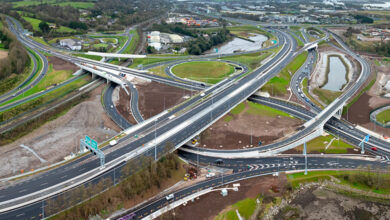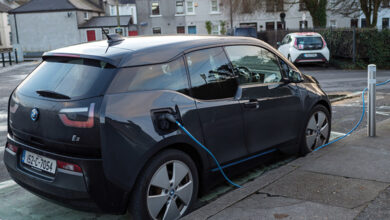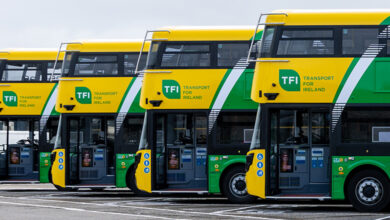Ambitions to almost treble EV charging power by 2025
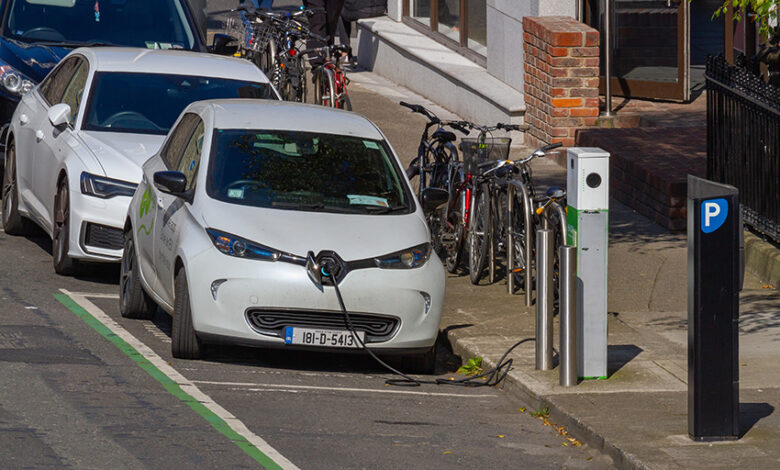
The Electric Vehicle Charging Infrastructure Strategy 2022-2025 will see in the region of €100 million spent over the next three years, aimed at enabling the target of one million electric vehicles in the State by 2030.
With the Climate Action Plan outlining a target for reducing emissions from the transport sector by 50 per cent, and the transport sector accounting for 20 per cent of the State’s emissions, the long-term target of getting one million EVs onto the road by 2030 requires significant improvement in the State’s existing EV infrastructure.
Strategy ambition
Planning for the short to medium term, the ambition of this strategy is to deliver the infrastructure to meet and be ahead of Ireland’s charging needs. Included in this ambition is to ensure alignment with the EU’s Alternative Fuels Infrastructure Regulation (AFIR).
The EU’s Alternative Fuels Infrastructure Regulation (AFIR) will set binding criteria regarding the minimum level of charging power available in each member state. Assuming Ireland will meet its CAP target of 195,000 light-duty EVs by 2025, approximately 169,000kW of charging power will be required across the country by the end of 2025. To achieve this and more will be the ambition set by the strategy. The types and numbers of charge points used to deliver this power will be based on user needs.
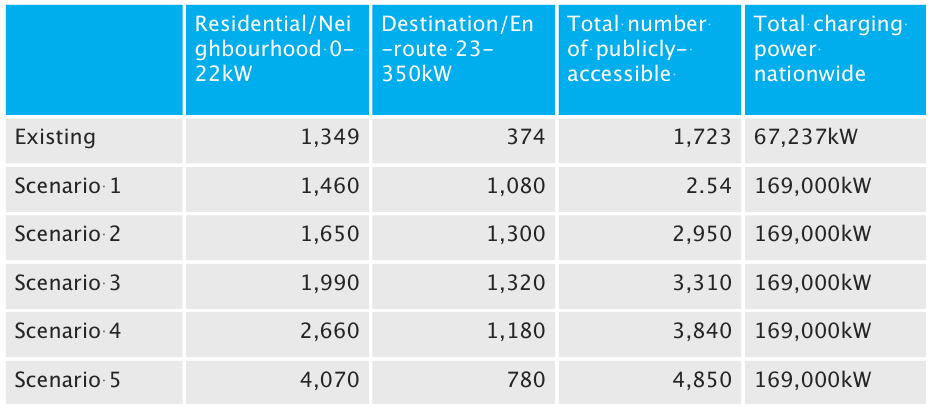
The number of charge points could increase from approximately 1,700 in September 2022 to somewhere between 2,540 and 4,850 by 2025. The following table shows a range of scenarios for how this demand may be met:
Implementation Plan actions
Implementation Plan 2023-2025 actions to drive delivery and to stimulate EV infrastructure availability will fall under four broad areas:
1. National EV Charging Network Plan: Aimed at producing a national EV charging infrastructure demand plan and related demand-supply assessment according to the electricity grid’s readiness to meet the projected demand between 2023 and 2025.
2. Schemes: Provides details on future milestones related to the progress of schemes planned to provide increased EV charging infrastructure.
3. Policy and strategy: Includes deliverables and related milestones for delivering the necessary policies in support of the expansion of EV charging infrastructure. It also deals with policies related to electric vehicles and EV transition.
4. Reporting and communications: Includes deliverables and actions that support the reporting and communications that need to be made to the public, as well as to the European Union under AFIR regulations.
It is important to note that the main delivery focus will be on the provision of public charging infrastructure for electric cars and light-duty vehicles. Charging infrastructure for heavy-duty vehicles will be delivered as the technology for this sector matures and in alignment with EU requirements.
“The EV Strategy sets out a roadmap for creating an entirely new infrastructure across the country – one that people can have confidence in and one that will encourage more and more people to choose EVs.”
Minister for Transport, Eamon Ryan TD
Home charging infrastructure
In October 2022, Minister for Housing, Local Government and Heritage Darragh O’Brien TD announced a new regulation stipulating that newly built homes must be equipped with electric vehicle charging infrastructure.
In a statement released on 12 November 2022, Minister O’Brien announced that the infrastructure will be built on: new homes with a parking space located within its boundary; new multi-unit residential buildings; and multi-unit residential buildings undergoing major renovation where the car park is located inside or adjacent to the building.
The Department of Housing, Local Government and Heritage stated that there are currently in the region of 45,000 electric vehicles being operated in the State. The Climate Action Plan commits the Government to ensuring that this number increases to at least 945,000 by 2030.
Announcing the new regulations, Minister O’Brien stated: “The regulations will help accelerate the uptake of electric vehicles, creating and enabling infrastructure to achieve the government commitment of nearly one million electric vehicles by 2030. We are sending a strong signal of Ireland’s commitment to the clean energy transition, as the building sector has a vast potential to contribute to a carbon-neutral and competitive economy.”
Government guidance
Describing the action plan as having a ‘people first’ approach, Minister for Transport Eamon Ryan TD said: “The EV Strategy sets out a roadmap for creating an entirely new infrastructure across the country – one that people can have confidence in and one that will encourage more and more people to choose EVs.
“It is happening already – EV sales are sky-rocketing – but the new infrastructure we are planning should take away concern or worry that people might have about access to charging points.”
The Minister concluded by outlining the “key anchor” for the strategy; the ZEVI unit. “Within this unit, we have the expertise, the knowledge, the guidance, the resources that local authorities will need to be able to make the best decisions on the procurement, leasing and location of EV chargers.”


